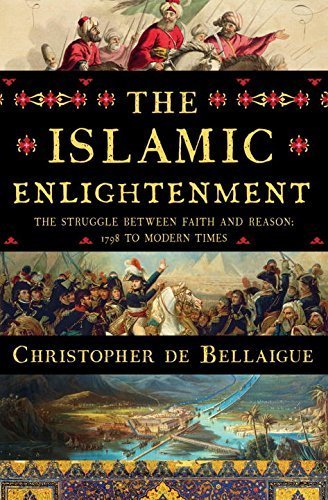The Islamic Enlightenment
 From the Fifteenth through Eighteenth Centuries, Europe went through a fairly profound cultural transformation, beginning with the Renaissance, and ending with the Enlightenment. The philosophies developed during all of this were powerful, and came at the same time as the physical horizons broadened, with the discovery of the New World and new routes to Asia. All of this helped develop government and military systems capable of defeating armies anywhere else in the world (largely by practicing on each other in wars kicked off by the same process).
From the Fifteenth through Eighteenth Centuries, Europe went through a fairly profound cultural transformation, beginning with the Renaissance, and ending with the Enlightenment. The philosophies developed during all of this were powerful, and came at the same time as the physical horizons broadened, with the discovery of the New World and new routes to Asia. All of this helped develop government and military systems capable of defeating armies anywhere else in the world (largely by practicing on each other in wars kicked off by the same process).
de Bellaigue starts his book with one of the most dramatic of these encounters, when Napoleon comes to Egypt and defeats the existing Moslem armies with barely any trouble. Operating far from his base in a siege is a big problem, and governing Egypt is more of a problem, but the French army wasn’t going to be defeated in the field. This becomes the first point where the Moslem world becomes aware that something has certainly happened in Europe, and gets directly exposed to the latest philosophical inventions of a place that had for so long so little to say.
This book is not the story of a home-grown Islamic equivalent to the European Enlightenment. This is the story of a religion having to grapple with a very dynamic set of ideas being imposed on what had been a relatively static society. European society had a hard enough time with this itself with more than three centuries to work through ideas that had stared (ostensibly) as a rediscovery of its own past. In 1798, Egypt got a sudden education in the end result of all this.
The first half of the book focuses on three of the major centers of the Islamic world, showing how each one dealt with these new ideas in turn. Starting with Egypt, then Istanbul, and then Tehran. The second half traces through the next century in a more unified approach, as people everywhere talked to each other about this, reinforcing the spread of ideas, debating about them, demanding progress, demanding morality. For, as with anything else, all actions have a reaction. In all of this, de Bellaigue discusses the people behind it all. The people who listened to Napoleon’s savants, the ones who studied abroad, the ones who published journals and newspapers, the ones who wanted to bring this to Islam, the ones who grew disillusioned. This book is full of threads for further exploration.
In some ways, the book feels a little disappointing because it is by its nature an unfinished story. It would seem the Islamic world has managed to find a new stability with distinctly authoritarian governments that practice many of repressive measures that the Enlightenment argues against. This reaction is largely due to European meddling that was allowed in because various leaders wanted all the things that had come along with the Enlightenment, guns, airplanes, and all the forms of power in the modern world. As I write this, there are massive demonstrations across Iran that trace back to similar protests touched on in this book. The waters run deep, but they aren’t very still.

Discussion ¬